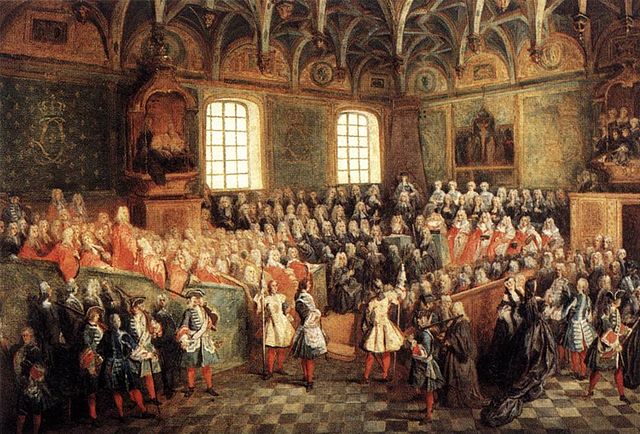
Please Follow us on Gab, Minds, Telegram, Rumble, Gab TV, GETTR, Truth Social
June 19th saw the second round of the French Parliamentary elections. For the first time since the 1980’s, the President of France’s party failed to gain a majority in the Parliament. President Emanuel Macron and his party are now facing a very uncertain future without a working majority. Macron could already be headed to lame duck status, just two months into his five-year term.
Going into the details shows Macron’s party with far fewer seats than a majority, and a long shot at a working coalition. President Macron’s party, La Republique en Marche, won only 245 of the 577 seats in the Parliament (42%), 44 seats short of a majority. The populist left coalition, the Nupes, won 131 seats (22.7% of the total) and will be a large thorn in the side of Macron. In third place was the populist right party National Rally (Rassemblement National) which won 89 seats, its best showing ever. In fourth place was the traditional center right party Les Republicains with 64 seats.
| Party | Seats | % of Seats |
| La Republique en Marche | 245 | 42% |
| Nupes | 131 | 23% |
| Rassemblement National | 89 | 15% |
| Les Republicains | 64 | 11% |
| Others | 53 | 9% |
| 577 | 100% |
In 2017, Macron comfortably won the Presidency, and his party won a whopping 350 of the total 577 seats. They were able to use this advantage to easily drive through their agenda the past five years, despite the lack of popular support for some things like COVID lockdowns.
In France, the President drives the policy agenda at the high level and the foreign policy framework. The real work of domestic policy is done in the Parliament, led by the President’s appointed Prime Minister. Without such a Prime Minister appointed, as of this writing, and a less than majority in the Parliament, it will be very hard for his administration to drive anything successful policy-wise.
Rumors are starting already of another no confidence vote, or of Macron calling new elections later this year. Time will tell. Early suggestions of working together among the four parties have all fallen flat. No party will work with the Rassemblement National, who will basically be a protest vote. Despite their candidate Pecresse endorsing Macron in the Presidential election, Les Republicains have said until now they will not work with Macron.
On the left, Nupes ran as a protest vote against the government and has said it will oppose Macron’s neo-liberalism. It was widely viewed as a snub that its leader, Jean Luc Melenchon, was not named Prime Minister. Melenchon proposed a coalition between Nupes and other extreme left parties like the communists, which was roundly rejected.
There has been some talk of what’s called a ‘stereo coalition’, where Macron would work with the Republicains on centrist economic policies, and with Nupes on certain others policies to the left, such as carbon emissions. That may be possible but will require deft maneuvering by Macron and his cabinet. There was an internal split in the Republicains party during the election, and the idea that 75% of them will support Macron seems a tall order.
What Next for Parliament
Macron is stuck with this Parliament for the next five years. From here, this can go three ways. The first scenario is Macron appoints a conciliatory prime minister, and that PM works diligently across the aisle to get a limited agenda approved. That would greatly limit the options of what can get approved but would produce a functional government.
Secondly, Macron can try to redo his agenda and public image, and gamble on new elections later this year to give him a majority. Despite a brief rise around the Ukraine war, Macron’s popularity has been low since COVID started, as lockdowns and inflation made the French people miserable. It’s hard to see what he could do to engineer a big pop later this year to secure a majority. The flip side of this is that if his approval continues to crash, Parliament may try to trigger a no-confidence vote in the prime Minister and try to get an alternative coalition to run things.
The third option is the lame duck status we have mentioned, where Macron is able to do as he pleases on foreign policy but have zero domestic agenda.
Populism’s March Continues
As we discussed in our piece on the Presidential Election, the march of populism continues in France and seems about half-way to the levels reached in places like the US, UK and Italy. France has been governed by a center left and center right party system at the Presidential level until now. Yet the traditional right wing [Les Republicains] has collapsed, replaced by the rising populist right, who managed to secure almost 25% of the Parliament. The center left and left wing are seeing a huge challenge by the populist and extreme left, and those parties managed to get two thirds of the total seats of the establishment left parties.
This cycle will probably see, similar to the Democratic party in the USA, a break between the center left and populist left and a total inability to accomplish anything major. Over the next five years, France will likely continue to swing to the right. The establishment left first took office in 2012, and then saw Macron win in 2017. By 2027, the end of Macron’s second term, there will be only one leader to blame for the failures of the prior decade. This should trigger a large swing to the right, led by populists. Whether that is the Rassemblement National, newcomer Eric Zemmour, or a reconstituted Les Republicains party remains to be seen.
Follow Decoding Politics on Twitter: https://twitter.com/DecodingPoliti2
For Inquiries/Comments: [email protected]
Subscribe to our evening newsletter to stay informed during these challenging times!!